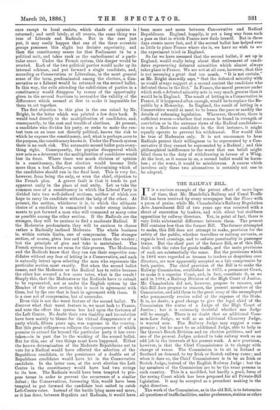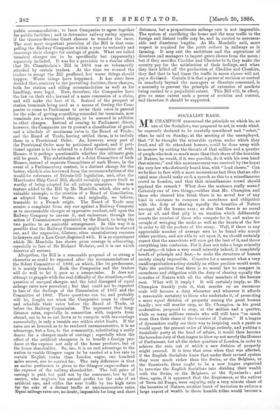THE RAILWAY BILL.
TT is a curious example of the potent effect of mare lapse of time, that Mr. Mundella's Railway and Canal Traffic Bill has been received by every newspaper but the Times with
a paean of praise, while Mr. Chamberlain's Railway Regulation Acts Amendment Bill of two years ago was received with a shout of execration by traders, and with silent but stubborn opposition by railway directors. Yet, in point of fact, there is very little substantial difference between them. The present
Bill contains less than the former Bill. The former attempted to make, this Bill does not attempt to make, provision for the safety of the public, whether travellers or railway servants, as regards level crossings, and to enforce punctuality in passenger trains. But the chief part of the former Bill, as of this Bill, dealt with the rates for goods traffic, and the main provisions of each are substantially the same. But the provisions which in 1884 were regarded as treason to traders or despotism over directors, are now apparently accepted as a fair compromise by both parties. The chief provision of the Bill is to make the Railway Commission, established in 1873, a permanent Court, to make it a superior Court, and, in fact, constitute it, as we said in 1884, a Railway Division of the High Court of Justice. Mr. Chamberlain did not, however, propose to remove, and this Bill does propose to remove, the present members of the Commission, and add them to the great army of the unemployed who permanently receive relief at the expense of the State. It is, no doubt, a good change to give the legal chief of the Commission the status of a Judge of the High Court of Justice ; but it is extremely doubtful whether one Judge will be enough. There is no doubt that an additional Com- mon-Law Judge, as well as an additional Chancery Judge, is wanted now. The Railway Judge may suggest a com- promise ; but he must be an additional Judge, able to help in the Queen's Bench Division and on election petitions, and not one of the present Judges ordered to take railway work as an odd job in the intervals of his present work. A new provision, however, is that the Chief Commissioner is to change with change of venue. The Commission is to sit in Ireland or Scotland on demand, to try Irish or Scotch railway cases ; and when it does so, the Chief Commissioner is to be an Irish or Scotch Judge, instead of the English Railway Judge ; but the lay members of the Commission are to be the same persons in each country. This is a modified, but hardly a good, form of the roving Court which has been proposed for all Private-Bill legislation. It may be accepted as a precedent making in the right direction.
The work of the Commission, as in the old Bill, is to determine all questions of traffic facilities, undue preference, station or other public accommodation ; to force Companies to agree together for public facilities ; and to determine railway rating appeals, if the Quarter-Sessions Court chooses to transfer the cases.
The next most important provision of the Bill is that com- pelling the Railway Companies within a year to reclassify and rearrange their charges for carriage of goods. What are called terminal charges are to be specifically but (apparently) separately included. It was for a provision to a similar effect that Mr. Chamberlain's Bill in ]884 was so vehemently attacked by certain traders. At the time we warned the traders to accept the Bill proffered, lest worse things should happen. Worse things have happened. It has since been decided that, contrary to the prevailing doctrine, these charges, both for station and siding accommodation as well as for handling, were legal. Now, therefore, the Companies have the law on their side, instead of a mere concession of a claim, and will make the best of it. Instead of the prospect of station terminals being used as a means of forcing the Com- panies to come to Parliament to revise their rates in general for the sake of getting something conceded for terminals, now terminals are a recognised charge, to be assessed in addition to other charges. Instead of coming to Parliament direct, however, the Companies are to present a classification of goods and a schedule of maximum rates to the Board of Trade ; and the Board of Trade, having settled them, is to include them in a Provisional Order. As, however, every part of the Provisional Order may be petitioned against, and if peti- tioned against is to be referred to a Joint Committee of both Houses, it is perhaps questionable whether the ultimate gain will be great. The substitution of a Joint Committee of both Houses, instead of separate Committees of each House, in the event of a Parliamentary contest, is a distinct change for the better, which is also borrowed from the recommendations of the would-be reformers of Private-bill legislation, and, after the Manchester Ship Canal Bill, should certainly approve itself as worthy of being adopted for all private measures. One new feature added to the Bill by Mr. Mundella, which also sets a valuable example, is the creation of a Board of Conciliation, as adopted from the States, and originally, we believe, traceable to a French origin. The Board of Trade may receive a complaint from any one against a Railway Company as to unreasonable charges or oppressive conduct, call upon the Railway Company to answer it, and endeavour, through the action of Commissioners appointed by the Board, to bring the two parties to an amicable arrangement. In this way it is possible that the Railway Commission might in time be starved out, and the expensive, dilatory, often unsatisfactory recourse to lawyers and a Law Court dispensed with. It is an experiment which Mr. Mundella has shown great courage in advocating, especially in face of Sir Richard Webster, and it is one which deserves all success.
Altogether, the Bill is a reasonable proposal of as strong a character as could be expected after the recommendations of the Select Committee of 1882, on which, like its predecessor, it is mainly founded. Both the Companies and the traders will do well to let it pass as a compromise. It does not attempt to grapple with the real difficulty of the situation,—the question of unequal charges, and the total disregard of equal mileage rates now prevalent ; but that could not be expected in face of the findings of the Commission of 1867 and the Committee of 1882. These questions can be, and probably will be, fought out when the Companies come to classify and schedule their rates before the Board of Trade, or before the Railway Commission. The argument that long- distance rates, especially in connection with imports from abroad, are to be so cut down as to compete with sea-carriage successfully, is only a tenable one within strict limits. If the rates are so lowered as to be rendered unremunerative, it is no advantage, but a loss, to the community, substituting a really dearer for a cheaper mode of carriage ; especially when the effect of the artificial cheapness is to benefit a foreign pro- ducer at the expense not only of the home producer, but of the home shareholder. So, too, it is no real advantage to the nation to enable Glasgow sugar to be carried at a less rate to certain English towns than London sugar, one hundred miles nearer, can be carried for. The only difference is that an undue preference is given to the Glasgow sugar-refiner at the expense of the railway shareholder. The full price of carriage is paid, but paid not by the consumer, but by the carrier, who neglects his natural profits for the sake of an artificial one, and stifles the near traffic by too high rates for the sake of a distant traffic at unremunerative rates. Equal mileage rates are, no doubt, impossible for long and short distances, but a proportionate mileage rate is not impossible. The system of sacrificing the home and the near traffic to the foreign and distant traffic may be, and is, carried to unreason- able and disastrous lengths. As Mr. Mundella said, more respect is required for the petite culture in railways as in farming. It may suit the ambitions and the aspirations of directors and managers to import green cheese from the moon ; but if they sacrifice Cheddar and Cheshire to it, they make the country pay for the satisfaction of their feelings, and when they have killed off the production of Cheddar and Cheshire, they find that in bad times the traffic in moon cheese will not pay a dividend. Certain it is that a power of revision or control in somebody beyond the managers or directors concerned, is a necessity to prevent the principle of extension of markets being carried to a prejudicial extent. This Bill will, in effect, give to some extent such a power of revision and control, and therefore it should be supported.



































 Previous page
Previous page